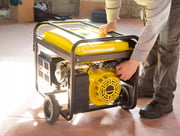Experts Issue Warning About Carbon Monoxide Dangers Ahead of Hurricane Ian

WEDNESDAY, Sept. 28, 2022 (HealthDay News) -- As Florida and nearby states brace for the potential impact of Hurricane Ian, residents in the storm's path should also think about the hazards they may face in its aftermath.
If high winds take out your electricity, the U.S. Consumer Product Safety Commission (CPSC) offers tips for staying safe.
First, be cautious about using a generator. The carbon monoxide (CO) from a portable generator can kill someone in minutes. Each year about 85 Americans die from CO poisoning from portable generators, the CPSC estimates. Click here for tips on using one safely.
The fumes are colorless and odorless and can render someone unconscious even before more obvious symptoms, such as nausea, dizziness and weakness, occur.
Never run a generator inside a home, garage, basement, crawlspace or shed. It’s not enough to open windows and doors. A lethal buildup of CO can happen even with ventilation. Carports and outside porches are a bad idea, too.
Instead, portable generators should be operated from at least 20 feet away from a home, with exhaust directed away from the home or any buildings anyone might enter. Close windows and other openings in the exhaust's path.
Keep your portable generator maintained and use it only as instructed in the owner’s manual.
If you're looking to buy a portable generator, choose one with a CO shut-off safety feature. These are designed to automatically turn off if high CO levels exist around the generator. Some models also have reduced emissions. Those with the latest safety standards, PGMA G300-2018 and UL 2201, reduce CO poisoning deaths by 87% and 100%, respectively, according to the safety experts.
You can further protect yourself by installing battery-operated CO alarms or CO alarms with battery backup on each level of your home. Also install them outside sleeping areas.
Alarms that are interconnected are best because they all sound when one detects carbon monoxide.
In addition, install smoke alarms on every level and inside each bedroom at home, too, and test all your alarms monthly. Replace batteries, if needed. Never ignore a sounding alarm. Instead, go outside and call 911.
It’s also unsafe to use charcoal indoors. It can produce lethal levels of CO in an enclosed space, including the garage — even with the door open.
Use flashlights instead of burning candles. If you do use candles, don't leave them unattended, do not use them near anything that can catch fire and extinguish them before sleeping.
Furthermore, don’t use appliances that got wet because of the hurricane. Avoid touching them if they are still plugged in; have an appliance professional or your gas or electric company evaluate them first. Replace all gas control valves, electrical wiring, circuit breakers and fuses that have been under water.
Also be on the lookout for gas leaks. Leave your house immediately if you smell or hear gas leaking and call local gas authorities. Do not operate any electronics, such as lights or phone, before leaving.
More information
The U.S. National Weather Service offers hurricane safety information.
SOURCE: U.S. Consumer Product Safety Commission, news release, Sept. 27, 2022

The news stories provided in Health News and our Health-E News Newsletter are a service of the nationally syndicated HealthDay® news and information company. Stories refer to national trends and breaking health news, and are not necessarily indicative of or always supported by our facility and providers. This information is provided for informational and educational purposes only, and is not intended to be a substitute for medical advice, diagnosis, or treatment.

